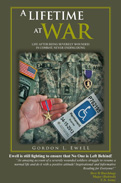"You have been severely wounded. This day is the day the war you were fighting ends. This day is the day your new war begins. This is the start of your war after the war."

 |
A Lifetime at War by Gordon L. Ewell Trafford Publishing
book review by Dylan Ward
Very few people ever experience a living hell much like that of war veterans returning from combat, only to return home to face a harsh new reality, often suffering from post-traumatic stress disorder, family and marital problems or the onset of extreme depression. But even more so, are the disabled war veterans who face a far more unique "war after the war" as Gordon Ewell puts it in his second book, A Lifetime at War. Here, Ewell lays bare his own dramatic struggle with life after becoming homebound, damaged and broken in far more ways than anyone might imagine. He offers a vivid account of his permanent life as a disabled veteran and how he has managed to find the strength to both recover and continue to live. Written as a testament of the surmounting odds that one disabled veteran faces every day, it is also a guide for the myriad other disabled veterans who must learn to live normal life all over again.
Nothing is normal anymore. Ewell gave twenty-four years of service to the military, most recently serving as an expert in tactics and techniques of bombs as a "bomb hunter" in the Iraq War. His career abruptly ended when a road-side bomb, or IED, exploded in Iraq, nearly killing him. From that moment forward, Ewell's life took a very different path that would require extensive medical attention, surgeries, physical therapy and rehabilitation, and it will never end. After everything, Ewell was left legally blind with minimal use of one eye and a prosthetic eye that fills the space of his second eye. The extent of his injuries required numerous surgeries in various hospitals in various states, craniofacial reconstruction, a cochlear implant and hearing aid to assist his hearing loss. He has brain damage and suffers from black outs, rendering him unable to drive and requires the use of a helmet to prevent injuries when he falls, which he seldom wears. Depending on how well his legs work on a particular day, he relies on the use of canes to walk or a wheelchair to stay mobile. But what may be the most emasculating task he faces each day is the use of a urethra catheter to help him with the simple necessity of relieving his bladder, a function that his brain no longer controls.
"I feel like Frankenstein. Or rather, like I am an anorexic, a broken and frail version of him." This is how Ewell describes himself as he looks into the mirror each morning at the start of his daily routine, one that can take an hour, if not more, for the simple tasks that many of us may take for granted, such as brushing his teeth, using the restroom, showering, and getting dressed. He admits that many times this takes its toll and he finds himself feeling sorry for the way that he looks and how he feels, but somehow realizes in spite of this, he must go on. "I usually feel sorry for myself for a few more minutes before kicking myself mentally in the ass and telling myself I had better start counting blessings. For too many of my fallen brothers and sisters, just one bomb made them a memory. A name etched on a stone and placed somewhere that few will visit on a regular basis and many forget as time passes, unfortunately. Every one of them is a hero."
After five long years of recovery and the publication of two books, with a third on the way, Ewell offers a glimpse of his changed life through pictures and seems to have improved significantly, finding his life-long mission to help other disabled veterans navigate the brutal and difficult road of recovery. This book is another such way in which Ewell reaches out to support and help those that are facing the same difficult road that he has traveled. Divided into three sections, the first section is Ewell's personal story of his journey through recovery, interspersed with his personal advice to others that are afflicted with the same fate. He gives positive messages of how to look forward and never fall into despair, that this is not the end of the world. The second section is a collection of poems, some written by Ewell and some by Richard Hamilton. The third section is his "Gordy-isms," his personal thoughts and words of wisdom that he wrote daily to help him get through the day. These Gordy-isms have been praised by fans on Facebook, and so he offers them here to end the book with an uplifting note. For anyone that needs inspiration, Ewell's book is an astonishing reminder of the extraordinary will to survive and the power of the human spirit.
RECOMMENDED by the US Review